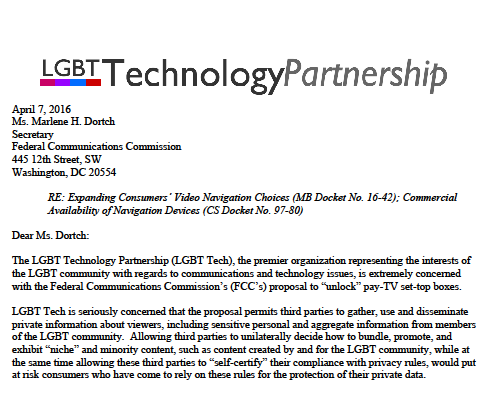LGBT Tech Group Has Problems With Set-Top Privacy Plan
The smarter way to stay on top of the multichannel video marketplace. Sign up below.
You are now subscribed
Your newsletter sign-up was successful

The LGBT Technology Partnership told the FCC it is "seriously concerned" about the FCC's set-top box proposal.
FCC Chairman Tom Wheeler, with the votes of the two other Democratic commissioners, has proposed making MVPD set-top data available to third party device makers and app developers as a way to promote competition in navigation devices.
In comments to the FCC the partnership focused on the protecting the privacy of that data, and their concerns the proposal did not sufficiently do that.
The partnership said lesbian, gay, bisexual and transgender community is particularly vulnerable to breaches revealing their programming choices, citing possible discrimination, job losses, bullying, and physical harms and saying being outed involuntarily can have "catastrophic consequences."
"Allowing third parties to unilaterally decide how to bundle, promote, and exhibit 'niche' and minority content, such as content created by and for the LGBT community, while at the same time allowing these third parties to 'self-certify' their compliance with privacy rules, would put at risk consumers who have come to rely on these rules for the protection of their private data," it said.
It also says the proposal could result in diverse programmers, like those serving the LGBT community, losing control of how their content is presented.
The group suggested the FCC would be better off switching gears and adopt the other, app-based, proposal--backed by cable and other ISPs--and also offered up by FCC's Downloadable Security Technology Advisory Committee (DSTAC)
The smarter way to stay on top of the multichannel video marketplace. Sign up below.
The partnership also echoed criticisms of edge providers' lack of diversity in employment and leadership which reduces the clarity of the lens through which privacy protections are viewed. "Historically, these companies have been bad actors with regards to protecting customer privacy and have only changed their privacy policies when they face litigation for said policies."
"In a digital world where privacy is already limited, why would we want to provide a loop hole for companies to further track our habits?," Chris Wood, executive director of the partnership, told Multichannel News, "especially when these companies have proved over time that they are willing to sacrifice our data and privacy for their profits. Furthermore, we only need to look at recent headlines in North Carolina, Mississippi or others to see that our community is too vulnerable have companies 'self-certify' they're doing the right thing. The FCC needs to fully consider the impact this decision could have on the LGBT community and other niche or minority communities for years to come."
The partnership is only the latest in a line of diversity advocates raising red flags about the impact on programmers and privacy.
Asked about the set-top proposal, FCC Chairman Tom Wheeler said in a C-SPAN interview this week that the FCC respects programming assets. He said the FCC did not want Google substituting commercials or putting windows around it, and that if the FCC proposal language needed adjusting, it could be fixed. "If that language isn't good enough, tell us how to fix it," he said.
Wheeler has also argued the proposal would be a boon to diversity by giving independent over-the-top content providers visibility via the new navigation devices that wed traditional and OTT content.
Contributing editor John Eggerton has been an editor and/or writer on media regulation, legislation and policy for over four decades, including covering the FCC, FTC, Congress, the major media trade associations, and the federal courts. In addition to Multichannel News and Broadcasting + Cable, his work has appeared in Radio World, TV Technology, TV Fax, This Week in Consumer Electronics, Variety and the Encyclopedia Britannica.

